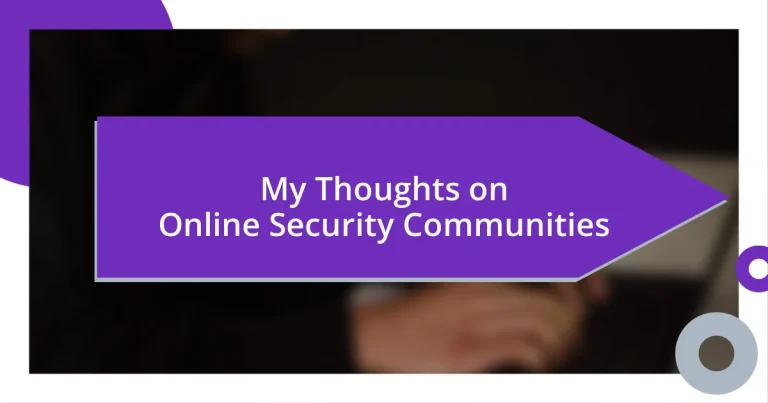Key takeaways:
- Online security communities provide vital support, resources, and diverse perspectives that enhance members’ understanding of cybersecurity.
- Engaging in these communities offers immediate access to collective knowledge, continuous learning opportunities, and valuable networking connections.
- Contributing to community knowledge and staying updated on security trends are essential for personal growth and improving the overall security awareness of the community.
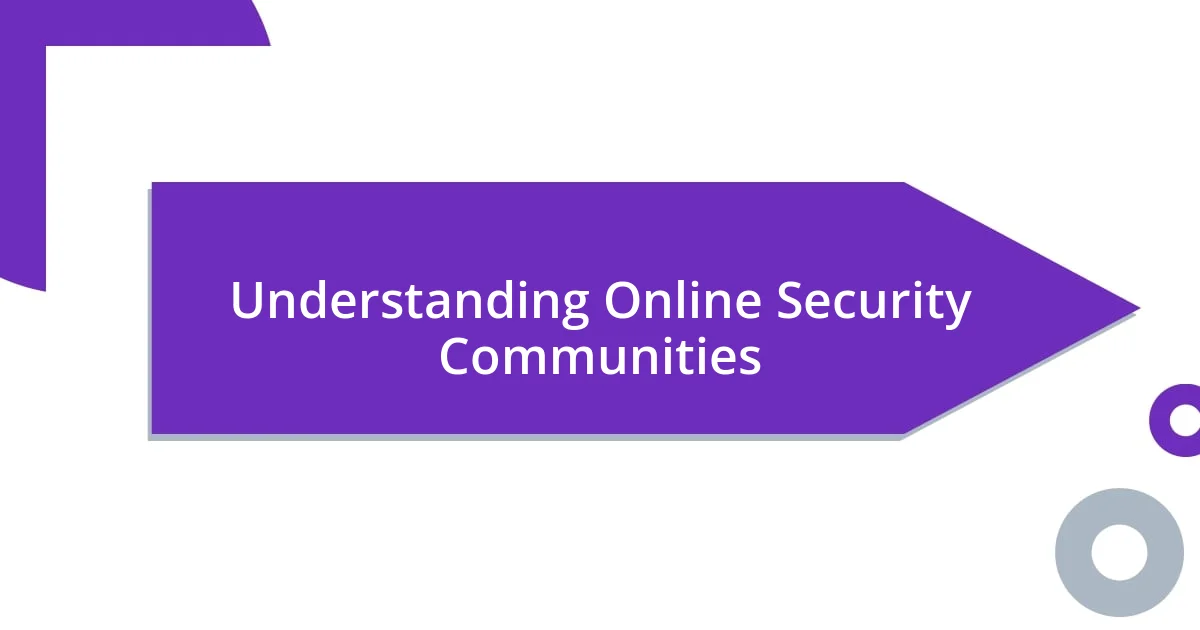
Understanding Online Security Communities
Online security communities serve as vital hubs for individuals passionate about cybersecurity, ranging from novices to seasoned professionals. I remember my first encounter with such a community; it was intimidating yet invigorating. The shared experiences and knowledge exchanged within these groups foster a sense of belonging and support.
These communities often provide members with the tools and resources to bolster their understanding of online threats and best practices in safeguarding their personal information. Have you ever felt overwhelmed by the sheer number of security threats out there? I certainly have. Engaging with others who are navigating the same challenges can be incredibly reassuring and enlightening.
Furthermore, the collaborative nature of these groups encourages diverse perspectives on security issues. I’ve seen firsthand how a simple question can spark a lively discussion, leading to solutions that would not have been found in isolation. It’s a testament to the power of community; when individuals come together, they create a wealth of knowledge that benefits everyone involved.
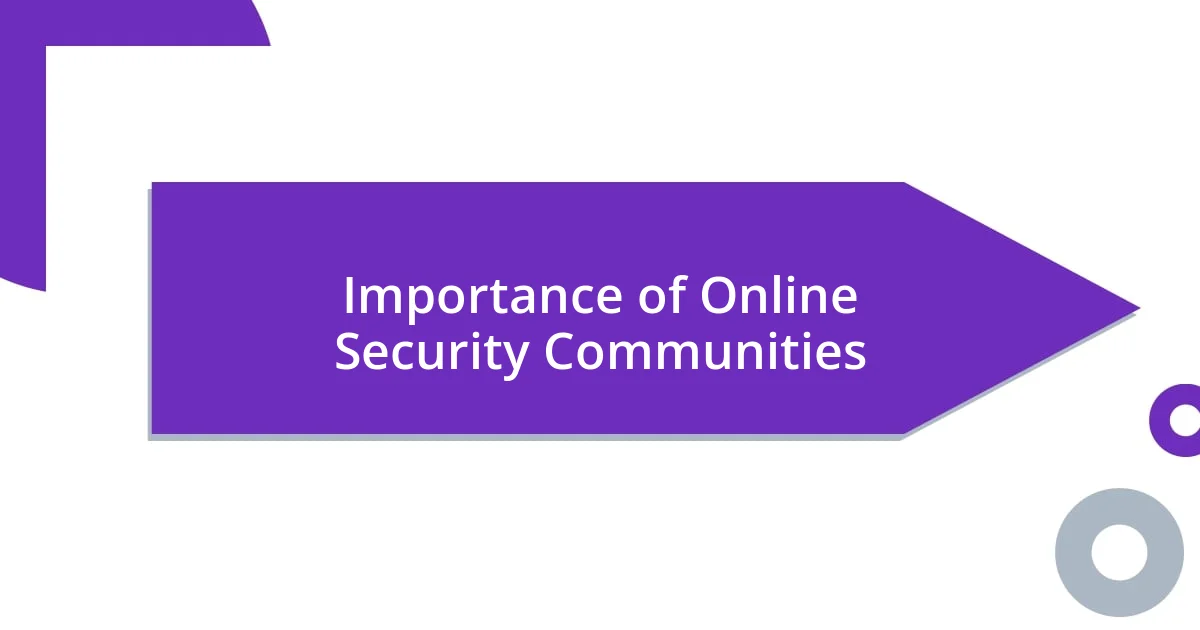
Importance of Online Security Communities
Online security communities play a crucial role in creating a secure online environment for everyone involved. I’ve been part of several groups where members share not just technical advice, but also personal stories about their experiences with cyber threats. It’s fascinating to see how these shared narratives can drive actionable insights. It’s like a collective cautionary tale that teaches us to be vigilant without instilling fear.
- They provide real-time support and advice on emerging threats.
- Members can share their unique experiences, creating a rich learning environment.
- These communities foster a culture of vigilance and proactive thinking about security.
- Collaborative projects often arise, allowing members to test their skills and tools.
- The emotional support found within these groups can ease the anxiety that often accompanies online security concerns.
I remember a time when I felt utterly helpless after a phishing attempt nearly compromised my personal information. Reaching out to my community, I quickly received responses that not only educated me about how to recognize threats but also reassured me that I wasn’t alone in facing such challenges. The camaraderie built in these groups transforms scary experiences into learning opportunities. It’s these shared connections and insights that highlight the importance of online security communities in our digital lives.
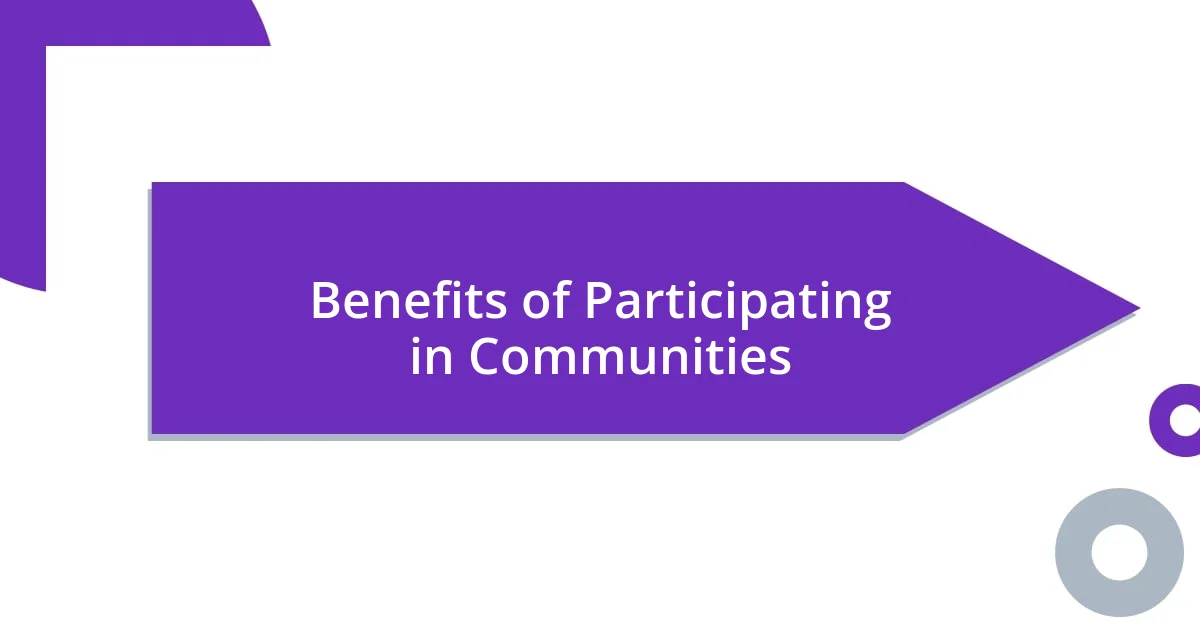
Benefits of Participating in Communities
Participating in online security communities brings a multitude of benefits that can enrich your experience. One major advantage is the immediate access to collective knowledge. I recall a moment when I was grappling with malware issues on my computer. Posting a question in a community not only yielded quick responses but also presented me with a variety of solutions from experienced members. This sense of urgency in receiving help is something you won’t find in a textbook, and it truly showcases the power of community support.
Another significant benefit is the opportunity for continuous learning. These communities often host workshops, webinars, and discussions on the latest trends in security. I attended a fascinating webinar last year that focused on the evolving nature of ransomware. Engaging with others during the session allowed me to grasp complex concepts in a more digestible way, feeling more empowered to tackle such threats. It’s moments like this that highlight how collaborative learning enhances our understanding of security practices.
Additionally, online security communities foster networking opportunities. You never know who might hold the key to an answer or a job opportunity. I connected with several professionals while sharing insight on data privacy measures, which eventually led to collaboration on a project that focused on creating awareness around data protection. The friendships and professional relationships cultivated in these forums can be invaluable for personal and career growth.
| Benefit | Description |
|---|---|
| Access to Collective Knowledge | Quick responses and diverse solutions from experienced members. |
| Continuous Learning | Engaging workshops and discussions enhance understanding of security topics. |
| Networking Opportunities | Building relationships that can lead to collaborations or job prospects. |
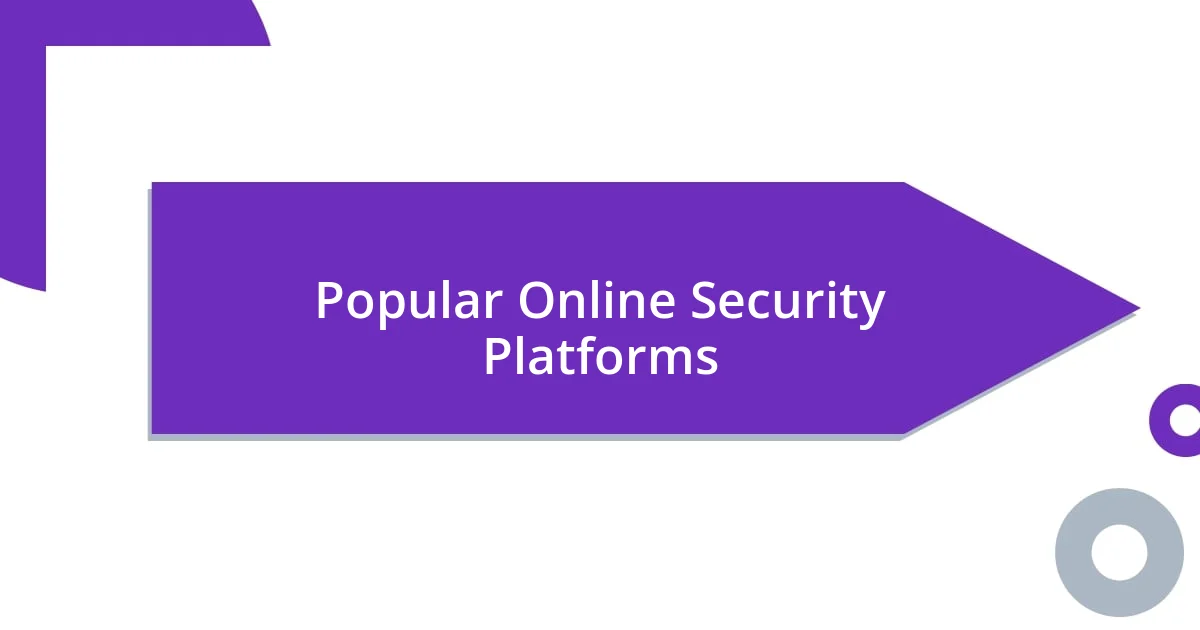
Popular Online Security Platforms
Exploring popular online security platforms is like stepping into a treasure trove of knowledge and support. For me, platforms like Reddit’s r/cybersecurity stand out as vibrant hubs where users often share real-time news about breaches and new hacking techniques. The diversity of backgrounds and experiences among members can really shine a light on different perspectives; it’s like listening to friends talk about their experiences at different levels of security awareness.
Then there’s the famous online community, Stack Exchange’s Information Security section. I vividly recall posting a query about a particularly brutal malware strain I encountered. The flood of responses helped me not only resolve my issue swiftly but also educated me on how to fortify my system against similar threats in the future. It’s those moments of sharing collective wisdom that remind me of the vital role these platforms play in our quest for online safety.
Another notable platform is Discord, which hosts various servers dedicated to cybersecurity discussions. Recently, I joined a server that focuses on ethical hacking. The thrill I felt during a live Capture The Flag (CTF) event—where we tested our skills against simulated security challenges—was intense. It’s exhilarating to work alongside passionate individuals, and the adrenaline rush makes learning feel almost like a game! Do you have a favorite online security resource? I believe that finding a community that resonates with your interests can significantly enhance your understanding of online security practices.
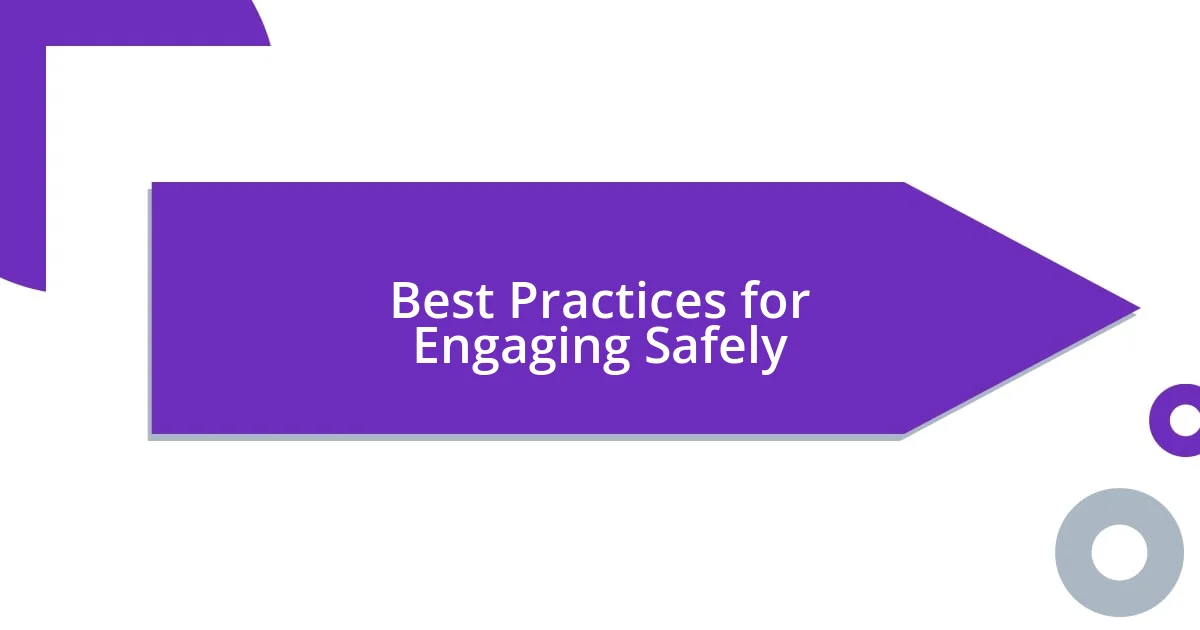
Best Practices for Engaging Safely
When engaging in online security communities, I recommend starting with a pseudonym. I remember joining a discussion group where members openly shared their experiences. Initially, I hesitated to use my real name, but once I adopted a pseudonym, I felt freer to ask questions and share insights without the worry of my identity being compromised. It’s a small step that can create a safer environment for open dialogue.
Additionally, always think before you share personal information. Early in my community engagements, I made the mistake of revealing my location while asking for advice on a cybersecurity threat. In hindsight, I realized that such details can be dangerous, as they might unwittingly provide potential attackers with valuable information. It’s essential to maintain a level of privacy and be cautious about what you disclose, even in seemingly secure spaces.
Lastly, participating actively and constructively is crucial. I once joined a thread where someone was struggling with account recovery after a breach. Instead of just lurking, I contributed my experience with similar situations and the steps I took to regain control. The positive feedback I received not only boosted my confidence but also fostered a sense of community. Have you ever experienced that rewarding feeling of helping someone? I find that engaging meaningfully with others strengthens the community and enhances everyone’s safety awareness.

Contributing to Community Knowledge
One of the most fulfilling aspects of being part of online security communities is the opportunity to share knowledge and learn from others’ experiences. I remember a time when I came across a user who described a sophisticated phishing scam that had almost tricked them. It inspired me to write a detailed post on recognizing red flags in suspicious emails. Seeing others respond with their own stories and tips created a vibrant exchange that not only informed but also formed deeper connections among us.
When contributing to community knowledge, it’s important to approach discussions with an open mind and a willingness to learn. I recall participating in a webinar hosted by a well-known expert in digital security. They presented a novel approach to encryption, and I found myself taking copious notes. By sharing my own insights and asking thoughtful questions during the Q&A, I felt like I was part of something much larger. Have you considered how your insights could bridge gaps in understanding for someone else? That kind of exchange not only uplifts individuals but also elevates the community’s overall knowledge base.
Each contribution, no matter how small, adds value to a community’s collective intelligence. I once shared a simple tip about enabling two-factor authentication after discovering how many friends hadn’t adopted it. Their responses ranged from gratitude to further questions, which sparked an ongoing discussion about enhancing security practices. It’s a potent reminder of how one person’s idea can inspire many. Isn’t it fascinating how our individual efforts can contribute to a larger movement towards improving online security for everyone?
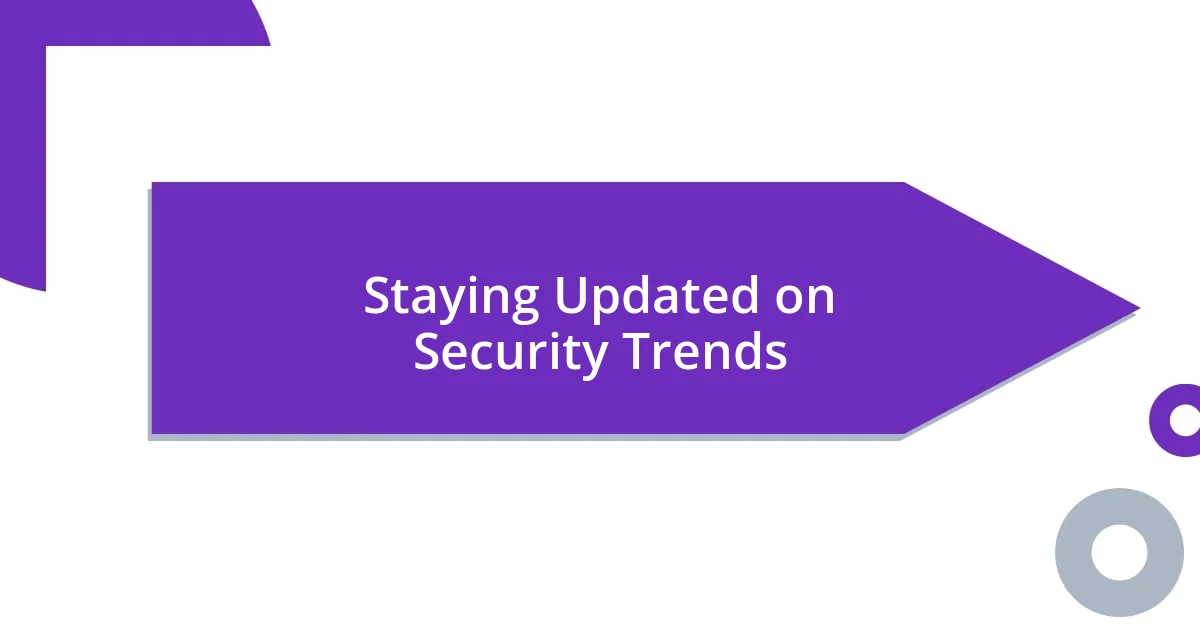
Staying Updated on Security Trends
Staying updated on security trends is not just beneficial; it’s essential in today’s fast-paced digital landscape. I often find myself scouring forums and following leading experts on social media platforms. There was a time when I stumbled upon a tweet highlighting a newly discovered vulnerability in popular software. That single thread not only informed me but prompted me to immediately check if I had the same software installed. Have you ever had a moment like that when timely information saved you a potential headache?
Moreover, subscribing to reputable newsletters and podcasts can be a game changer. I remember being introduced to a cybersecurity podcast during my morning commute. The host shared fascinating insights on the latest attack vectors and defensive strategies, turning what used to be a mundane drive into an engaging learning experience. It’s incredible how these small changes can transform our daily routines into opportunities for growth. Do you make time for consistent learning?
Another effective strategy is to participate in webinars and online training sessions. I attended a workshop on identifying social engineering tactics, and it opened my eyes to how easily information can be manipulated. Engaging with experts and asking questions made the material stick. Have you found that hands-on learning resonates more profoundly with you compared to reading alone? I’ve noticed that absorbing content this way often leads to richer discussions within communities, enhancing my understanding of current security threats. It’s a continuous journey, and staying updated is a fundamental part of keeping ourselves secure.












